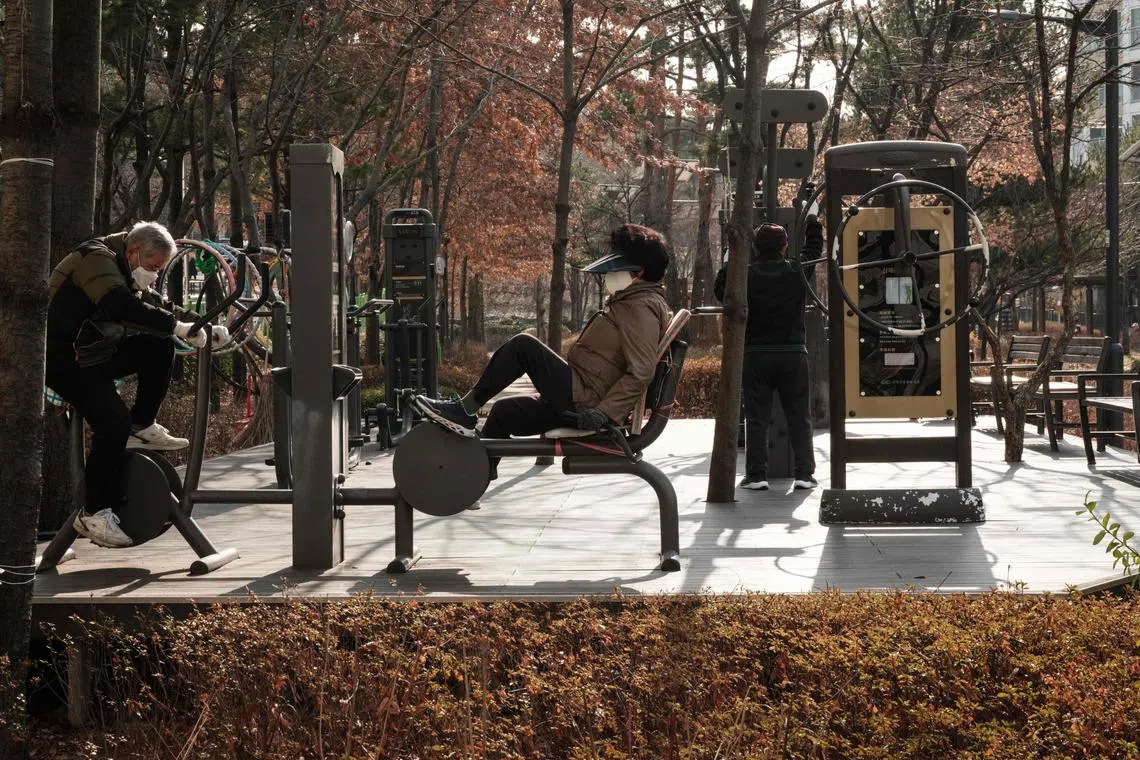In super-aged S. Korea, a Seoul district wants residents to get first spots in ‘elderly kindergartens’
Sign up now: Get ST's newsletters delivered to your inbox

South Korea officially became a “super-aged” society in 2024, with people aged over 65 making up more than 20 per cent of the population
PHOTO: AFP
Follow topic:
SEOUL – South Korea is running out of space for its super-ageing population and many neighbourhoods do not want care centres for older adults built in their apartment complexes.
To address this growing tension, the Eunpyeong-gu district in north-western Seoul is suggesting something new. It has formally proposed that residents of newly redeveloped apartment complexes be given priority access to care centres built as part of the redevelopment.
These facilities are typically constructed as public benefit contributions during large-scale private housing projects but often meet with resistance from residents who fear they will negatively affect property values.
The proposal, submitted to the central government, will require revising national laws, which currently prohibit any form of admission preference.
Still, district officials believe that offering residents a tangible benefit can help ease the pushback that has stalled many projects.
South Korea officially became a “super-aged” society in 2024, with people aged over 65 making up more than 20 per cent of the population, according to its Ministry of the Interior and Safety.
In Seoul, that figure is projected to rise to 30 per cent by 2038 and over 37 per cent by 2052, according to Statistics Korea.
As the country’s birth rate
As kindergartens close for lack of children, more space is being allocated to daytime care centres where older adults receive treatment for age-related conditions such as dementia or stroke.
But building those centres has not been easy.
A high-profile case in Yeouido saw a planned daycare centre for older adults held up for over a year due to protests from residents of the Sibeom Apartment complex, who feared that such a facility would tarnish the neighbourhood’s image.
The demand for senior care continues to outpace supply.
As at March, there were 23,371 seniors in Seoul eligible for long-term care but only 17,224 spots are available, according to city data.
Only 11 of the city’s 472 senior care centres are publicly operated. In Eunpyeong-gu’s public facility, just 75 beds serve hundreds on the waiting list.
Eunpyeong-gu mayor Kim Mi-kyung said the shortage has forced families to send older relatives to other districts.
“We need to expand care infrastructure in the places people actually live,” she said. “If we reduce the distance between seniors and their families, we also reduce the cost and stress on everyone involved.”
Still, national ministries have shown little urgency.
The ministries of Land and Health have both expressed concern that such legal changes could lead to complications, especially since care centres are meant to serve broader public needs.
THE KOREA HERALD/ASIA NEWS NETWORK

